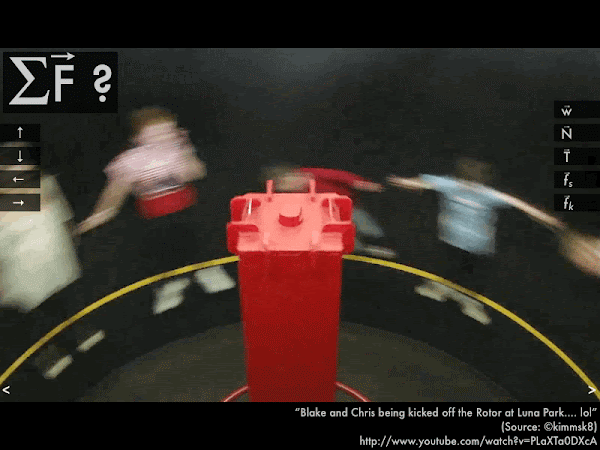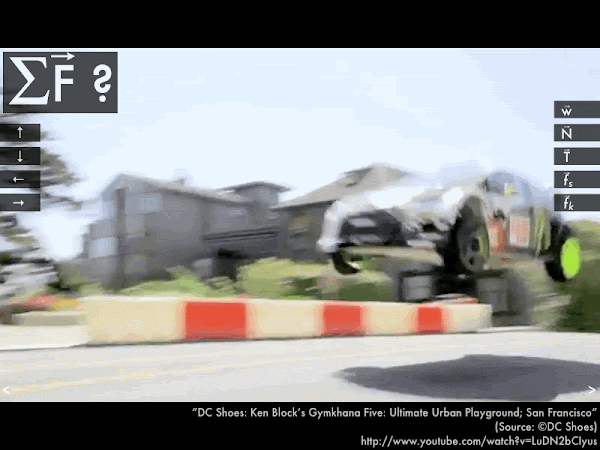Cuesta College, San Luis Obispo, CA
Students have a weekly online reading assignment (hosted by SurveyMonkey.com), where they answer questions based on reading their textbook, material covered in previous lectures, opinion questions, and/or asking (anonymous) questions or making (anonymous) comments. Full credit is given for completing the online reading assignment before next week's lecture, regardless if whether their answers are correct/incorrect. Selected results/questions/comments are addressed by the instructor at the start of the following lecture.
The following questions were asked on reading textbook chapters and previewing a presentation on uniform circular motion.

Selected/edited responses are given below.
Describe what you understand from the assigned textbook reading or presentation preview. Your description (2-3 sentences) should specifically demonstrate your level of understanding.
"Uniform circular motion will have velocity tangent to its circular path, and acceleration perpendicular to it, toward the center of the circle."
"How Newton's second law relates net force to circular motion. Even if the speed is constant, the direction is always changing."
"Nothing at all."
Describe what you found confusing from the assigned textbook reading or presentation preview. Your description (2-3 sentences) should specifically identify the concept(s) that you do not understand.
"The mathematical reasoning behind non-uniform circular motion is overly confusing. I find it difficult to translate this information into words."
"How to determine the direction of the net force for an object moving in a circle."
"While I understand most of the concepts, I don't get how to draw a free-body diagram for circular motion. And I don't understand what kind of questions you would ask about it."

first; is zero. * [1] second; points to the left. ************************** [26] second; points to the right. ************************** [26] (Unsure/lost/guessing/help!) ***** [5]

first; is zero. ************** [14] second; points upwards. ************************* [25] second; points downwards. ************* [13] (Unsure/lost/guessing/help!) ****** [6]

first; is zero. ***** [5] second; points to the left. ********************** [23] second; points to the right. ************************* [25] (Unsure/lost/guessing/help!) ****** [6]

first; is zero. ************* [13] second; points upwards. ************* [13] second; points downwards. ************************** [26] (Unsure/lost/guessing/help!) ****** [26]

first; is zero. ****** [6] second; points to the left. ******************** [20] second; points to the right. ******************** [20] (Unsure/lost/guessing/help!) ************ [12]

first; is zero. *************** [15] second; points upwards. ******** [8] second; points downwards. *************************** [27] (Unsure/lost/guessing/help!) ******** [8]

first; is zero. ************* [13] second; points upwards. ********** [10] second; points downwards. *************************** [27] (Unsure/lost/guessing/help!) ******** [8]
Ask the instructor an anonymous question, or make a comment. Selected questions/comments may be discussed in class.
"I'm good on this section."
"I look forward to the help you will give us."
"These questions about the net force on all these objects are asked multiple times, but never actually explained. Can you draw diagrams for each of the examples? Going over what's different with these new scenarios, such as loops and vertical banks, would be very helpful!" (Yes. Looking over the class' responses for these questions, you'll need some time on this in class.)
"If an object in uniform circular motion has a constant speed, but a changing direction, does that mean that Newton's second law still applies?" (Yes, exactly because the direction part of its motion is changing.)
"Would circular motion ever have zero forces at the top of its trajectory?" (No.)
"Will sample questions/study guides be available similar to quiz questions to help us practice? I feel the problems from the textbook are very different from problems you give us in class, so this would be a lot of help." (Yes, before every quiz (and exam) you'll get to work on the previous year's quizzes (and exams) for review. The older quiz and exam questions that are done as examples in class are intended to be different than those from the textbook, in being more direct in testing your understanding of the concepts involved, as opposed to being able to blindly solve for something.)
No comments:
Post a Comment